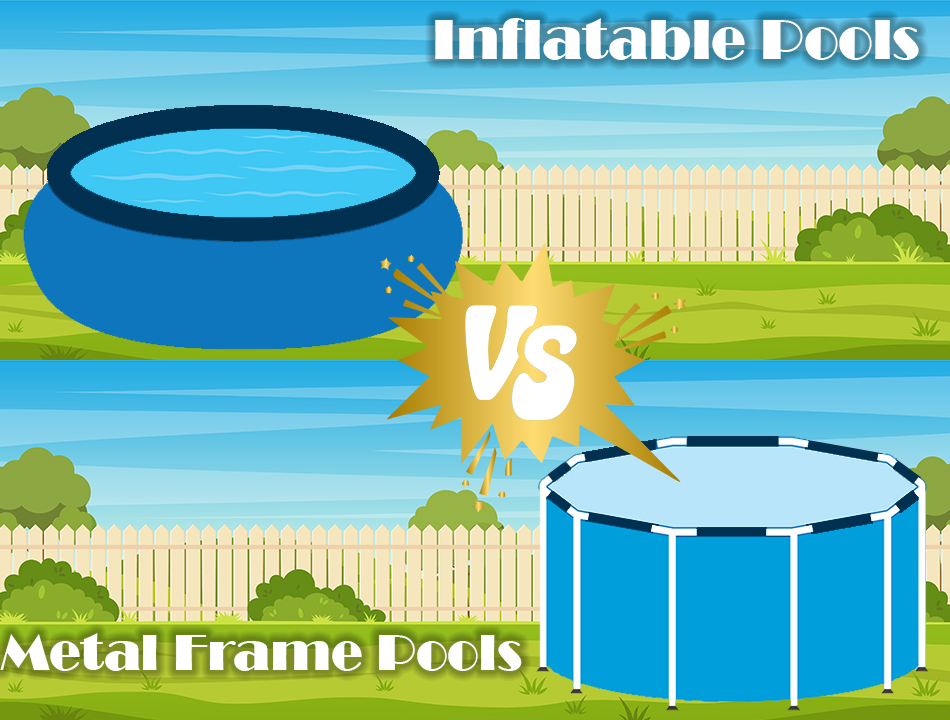
Looking to beat the heat this summer? A swimming pool is a great way to enjoy the outdoors, stay cool, and unwind as the temperatures rise. However, not everyone has the space, money, or commitment for a permanent above ground pool. Portable pools are the perfect solution to this, but which is the best option for you?
Metal frame and ultra frame pools, as well as inflatable pools, are popular options for portable pools. The choice between them often depends on factors such as intended use, available space, budget, and your personal preferences for durability, ease of setup, and portability.
Read on to explore six differences between these two types of portable pools.
Structure
As the name suggests, inflatable pools are made of durable, air-inflated vinyl or PVC material. They rely on air pressure to maintain their shape and structure.
Frame pools have a sturdy frame, typically made of steel or resin, which provides structural support for the pool walls and liner. Both inflatable and metal frame pools are available in round and rectangular sizes.
Setup & Installation
Inflatable pools are generally easier and faster to set up. They can be inflated using an air pump and don't require any tools or complex assembly.
Metal frame pools require more effort to assemble. The metal frame must be constructed, and the pool liner must be carefully installed and secured to the frame.
Size & Depth
Inflatable pools are typically smaller in size and have shallower depths, ranging from a few inches to a few feet in depth. They are best suited for children's play or lounging rather than swimming.
Metal frame pools can range in size from small to large and have depths of up to several feet, making them suitable for swimming and other water activities.
Durability & Longevity
Inflatable pools are generally considered less durable than frame pools and have a shorter lifespan, typically lasting 2-5 years with proper maintenance. They are more susceptible to punctures, leaks, and damage from exposure to sunlight and harsh weather conditions.
Metal frame pools are designed to be more robust and long-lasting, with a lifespan of 5-10 years or more, depending on the quality of the materials and the level of maintenance. The metal frame provides stability and resistance to environmental factors, and the pool liner can be replaced if needed, extending the pool's lifespan.
Portability
Inflatable pools are highly portable and can be easily deflated, moved, and stored when not in use, making them a convenient choice for those with limited space or who frequently need to relocate a pool.
Metal frame pools are less portable due to their rigid structure and heavier components. While they can be disassembled and relocated, the process is more involved and requires more effort.
Cost
While inflatable pools offer a more affordable and temporary solution, metal frame pools provide a more permanent and durable option, albeit at a higher cost.
Inflatable pools typically come with basic accessories like a filter pump, ladder, and cover. Metal frame pools come with similar accessories but can accommodate more advanced features, such as saltwater systems, decking, and additional filtration systems, which can significantly increase the overall cost.
Which Pool Should I Choose?
Whereas we can't answer for your definitively, we can offer some suggestions:
Choose an Inflatable Pool if you:
- Want something quick and temporary
- Have young kids
- Are renting or travelling with your pool
Choose a Metal Frame Pool if you:
- Want a semi-permanent summer setup
- Have older children or adults using it
- Want better durability and size
FAQs
What's the difference between inflatable and metal frame pools?
The primary difference between inflatable and metal frame pools lies in their construction and durability.
Inflatable pools are large, air-filled structures with a vinyl liner, while metal frame pools consist of a steel or aluminum framework supporting a liner.
Is a metal frame pool better than an inflatable pool?
Honestly, it depends on what you're looking for. For a more durable and long-lasting pool, a metal frame pool is generally better than an inflatable pool. However, inflatable pools are easier to set up and more portable, which may be more important to you.
How long do inflatable pools last?
Inflatable pools typically last for two to five years, provided they are correctly maintained and stored. However, it can depend on factors such as the quality of the building materials, usage, and the level of care they receive.
Are metal frame pools safe for kids?
With proper safety precautions and supervision, metal frame pools can be safe for children. Consider removing or securing potential climbing points such as ladders, furniture, or nearby structures. Ensure the pool is in good condition, checking the uprights, rails, and liners. Regularly test and maintain the pool water; cloudy or murky water can make it difficult to see the pool bottom, posing a hazard. Discourage jumping from the top rails, especially in shallower pools, as this can lead to falls and injuries. Ensure the pool depth is suitable for the age and swimming ability of the children using it. It is advisable to install a fence at least four feet high, accompanied by a self-closing, self-latching gate, to enhance safety by restricting access.
Can I leave a metal frame pool up all year?
Yes! You can keep your metal frame pool up all winter, but it's essential to take proper precautions to prevent damage. To winterize the pool, you will need to partially drain it, disconnect and store the pump and filter, and cover the pool adequately to protect it from debris and harsh weather conditions.






 Pools
Pools Spas
Spas Liners
Liners Equipment
Equipment Covers
Covers Accessories
Accessories Cleaning
Cleaning  Pool Fun
Pool Fun  Clearance
Clearance
